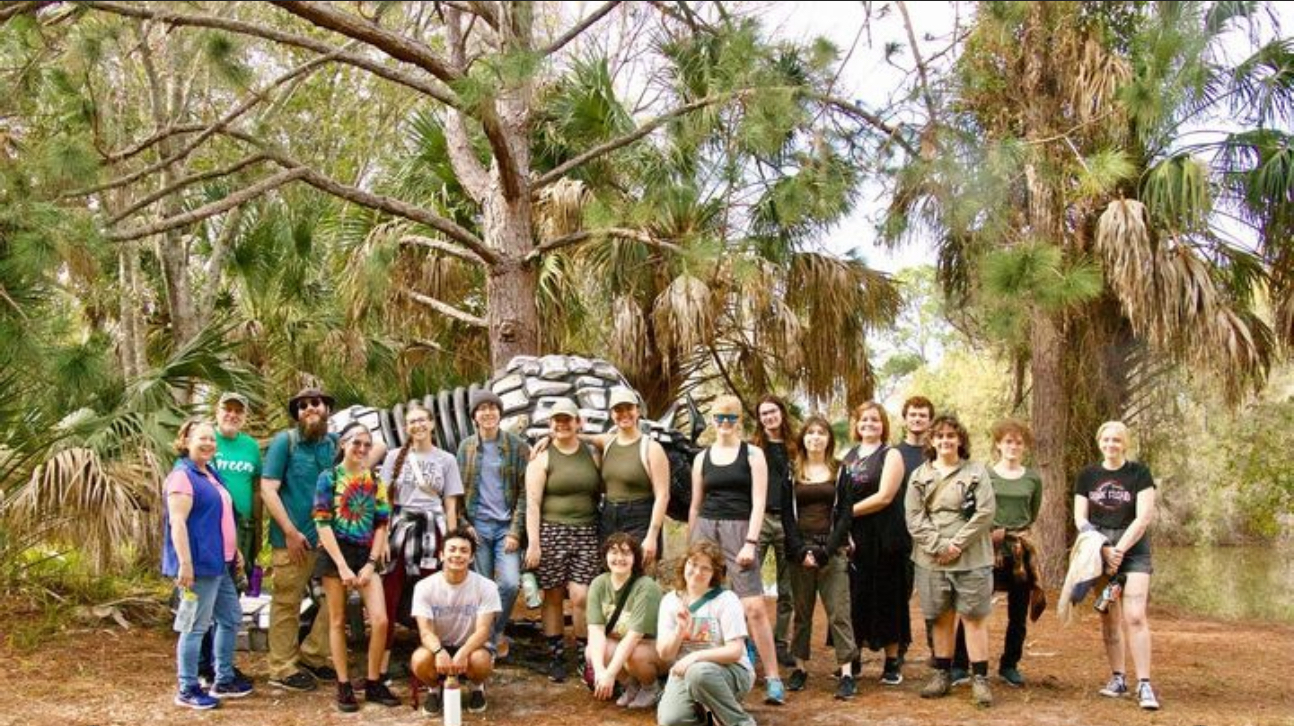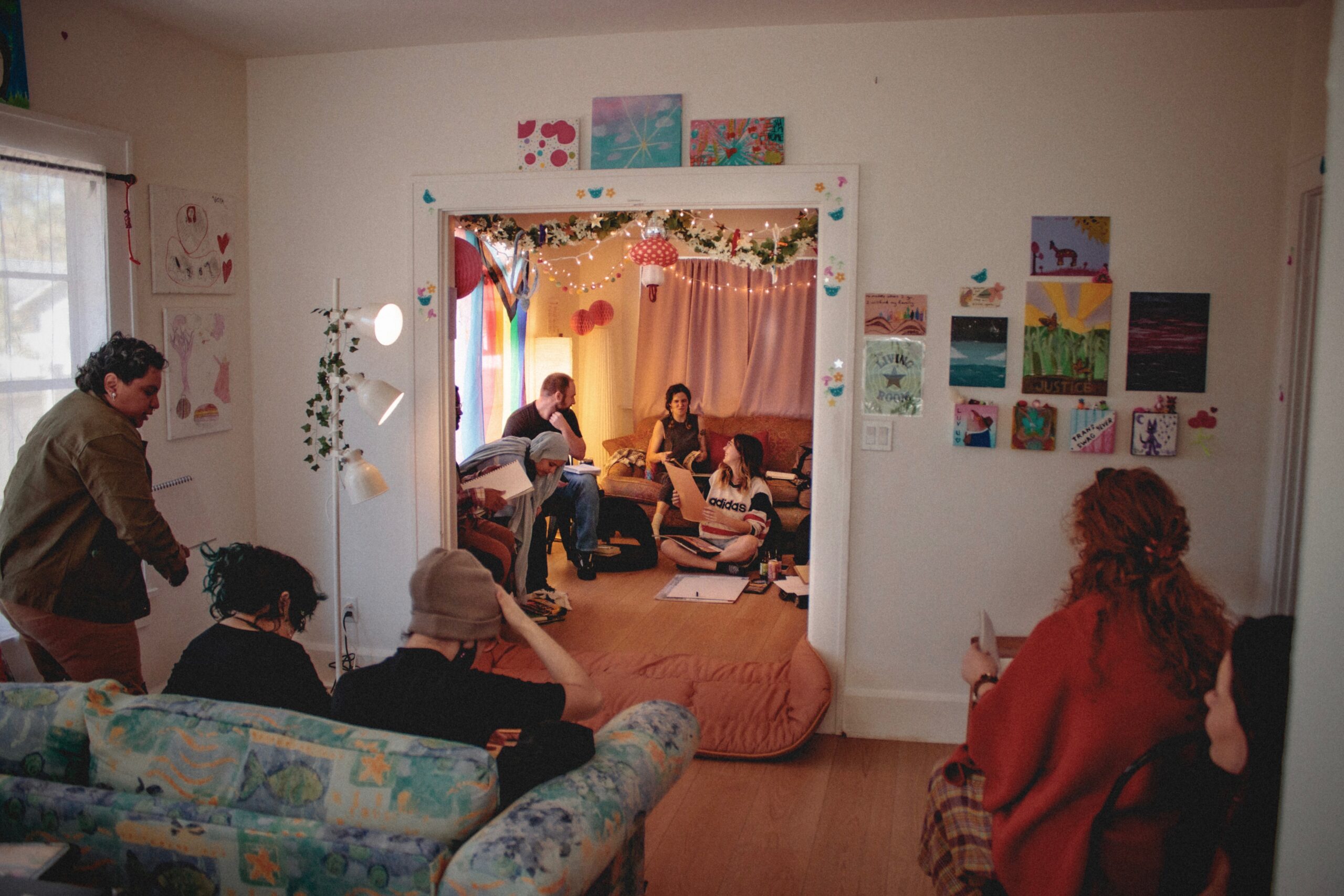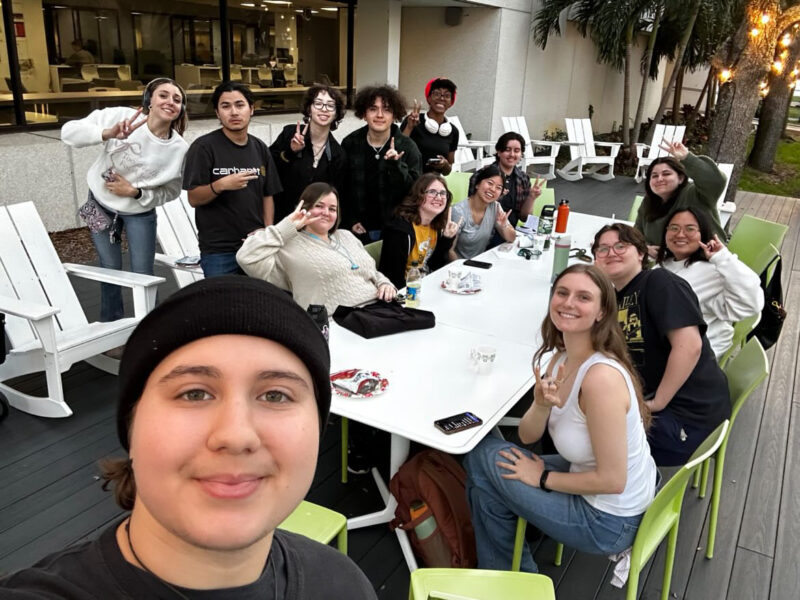Photo courtesy of outoutdoorsusfsp on Instagram
By Alisha Durosier
Through rustling leaves and the gentle trickling of shallow waters, the songs of varied species of birds echo. Hikers who venture into the Boyd Hill Nature Preserve in St. Petersburg hear their chirps, squalls and squawks.
For Ashby Barbee, biology junior at the University of South Florida St. Petersburg and avid bird watcher, tricolored, little blue and green herons are their favorite to spot.
Conversations about birds accompanied the heron squalls, as Barbee identified birds with their fellow hikers.
Coots, loons and common moorhens — birds who inhabit Boyd Hill — crossed paths with the group of 19 hikers, all of which were students and faculty members of Out Outdoors, USF St. Petersburg’s queer hiking club.
Out Outdoors held its first hike on the morning of Jan. 27 at the Boyd Hill Nature Preserve, 245 acres of protected land located in the center of St. Petersburg.
“We saw so many cool things. It was so fun, I made a new friend and I’m sure that all the other people made new friends,” Out Outdoors president and co-founder Jesse Roguska said.
It was a class discussion on how sexual orientation and gender interact with the environment in his environmental anthropology class that inspired Roguska to create a queer hiking club.
A friend and classmate of Roguska, Rain Weinstein, mentioned a hiking club for queer students at the University of Florida (UF), piquing Roguska’s interest.
A major topic of the discussion was fluidity, an aspect that nature and queerness share.
“Nature isn’t static. Sexuality, sexual orientation and culture are not static either,” Roguska said.
Ecosystems are biological communities sustained by the connection diverse organisms have with one another. Through organisms’ dependence on each other, ecosystems grow and become resilient. Very similar to how queer communities navigate their lives.
Queer people can often see a reflection of themselves in nature. Roguska believes this is a reason why queer people have such a connection to nature.
“To live a queer life is to embody nature, to be our true selves and accept the changes around us while influencing changes,” Roguska said.
Roguska inquired with his friend, USF St. Petersburg enviromental science and policy sophomore Oliver Laczko, the following weekend on a hike about his interest in starting a queer hiking club. Laczko, now co-founder and treasurer of Out Outdoors, agreed.
Before their first hike, the club held its first general body meeting during the fall semester’s final exam week. The goal was to simply gauge the potential interests of students in Out Outdoors. Even with such a “short notice and poor advertising,” 13 students attended, surprising Roguska and Laczko.
Those who attended the hike met at 9:30 a.m. at the Boyd Hill Nature Preserve. The group walked along a few of Boyd Hill’s six miles of trails. They hiked, talked and stopped to explore whatever caught their eyes.
“It wasn’t like you have to do this or you have to do that. It was just, enjoy what you see and the people around you at your own pace,” Barbee said.
Barbee’s interest in birds began as a child, it was mainly ignited by their father who has a keen interest in birds and bird watching.
“The safe queer space definitely attracted me. There’s always a need for more queer spaces. And to fill such a niche that I’m interested in really caught my attention so I can meet more like-minded people and express my own interest,” Barbee said.
This sentiment captures Roguska’s hopes for Out Outdoors — to forge a sanctuary for queer students, where they can develop relationships, experience a sense of community and access the support they may need.
Upon visiting USF St. Petersburg in 2021 before graduating high school, Roguska observed a vibrant on campus and surrounding queer community; he knew he could be safe here.
St. Petersburg is the first place where he saw two men holding hands. Pride flags adorned numerous places in the city, something Roguska wouldn’t witness in his hometown of Port Charlotte until 2022.
“I really just wanted to support my community and help other people make friends and find support systems because I feel like every single day queer rights are being taken away and we face more and more problems, especially in Florida,” Roguska said.
This past year, Florida universities have been navigating anti diversity, equity and inclusion (DEI) laws. The laws have forced the closures of DEI offices at the University of North Florida and UF. Last year, the legislature expanded the “Don’t Say Gay” bill and restrictions on gender-affirming care were also signed into law.
“So with how hard it is, especially for trans individuals and the impact it’s had on my friends, I saw a need for queer support. And so that’s why I started the club,” Roguska said.
For Barbee, feeling safe is beginning to feel difficult and they find the changes to Florida’s legislature emotionally exhausting.
“By having that space to kind of just talk about it with other people that are also being affected by it, it’s very validating and also gives a lot of hope and even encouragement going forward and not giving up and going back into your bubble,” Barbee said.
It’s not important to Roguska how many people attend meetings or go on their hikes.
Roguska doesn’t have any specific milestones he wants Out Outdoors to meet. To him, there is only so much one can do with numbers and it’s important to him that the club maintains its fluidity.
“If one person makes one friend or one person feels supported, or one person does something they wouldn’t normally do and go out on a hike with a bunch of other people who they know they’ll be safe with. That’s a win,” he said.



